Introduction
Healthcare marketing plans have become increasingly crucial. With the global healthcare market projected to reach $665.37 billion by 2028 (Grand View Research, 2021), effective marketing strategies are essential for healthcare providers to stand out.
Marketing in healthcare not only helps attract new patients but also educates communities about health services and promotes overall well-being.
Recent trends show a significant shift towards digital marketing for healthcare, with 72% of internet users searching for health information online (Pew Research Center, 2022). This digital transformation has paved the way for innovative tools like healthcare chatbots, which are revolutionizing patient engagement.
Chatbots in healthcare are proving to be invaluable for streamlining patient communication, scheduling appointments, and providing basic health information.
We will share 11 practical tips for your healthcare marketing plan. From understanding your audience to using chatbots on various platforms, these tips will help you reach your goals.
Let’s dive into crafting a successful healthcare marketing plan.
What is a Healthcare Marketing Plan?
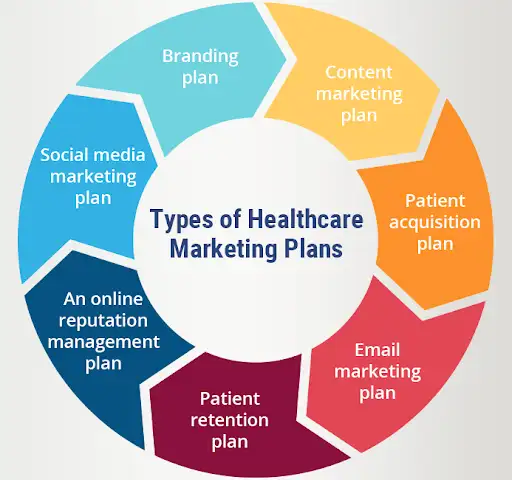
A healthcare marketing plan is a strategic roadmap designed to promote healthcare services.
A healthcare marketing plan outlines specific goals, target audiences, and the tactics needed to achieve these objectives.
Key Components of a Healthcare Marketing Plan
- Market Research: Understand the demographics and needs of your target audience. This healthcare marketing plan can help in tailoring messages that resonate with patients.
- Branding: Establish a clear and consistent brand that reflects the values and mission of your healthcare organization.
- Content Strategy: Create and distribute valuable content that informs and engages your audience. This includes blog posts, videos, and social media updates.
- Digital Presence: Optimize your website and use SEO techniques to ensure that potential patients can find your services easily.
- Social Media Marketing: Utilize platforms like Facebook, Instagram, and LinkedIn to connect with patients and share relevant content.
- Healthcare Chatbots: Implement chatbots in healthcare marketing plan to provide instant support and information to patients on various platforms, including your website and social media.
- Email Campaigns: Use email to keep patients informed about new services, health tips, and special offers.
- Performance Monitoring: Track the success of your marketing efforts using analytics tools. This helps in understanding what works and what needs improvement.
By incorporating these elements, a healthcare marketing plan ensures that your marketing efforts are organized and focused on achieving measurable results.
Benefits of a Healthcare Marketing Plan
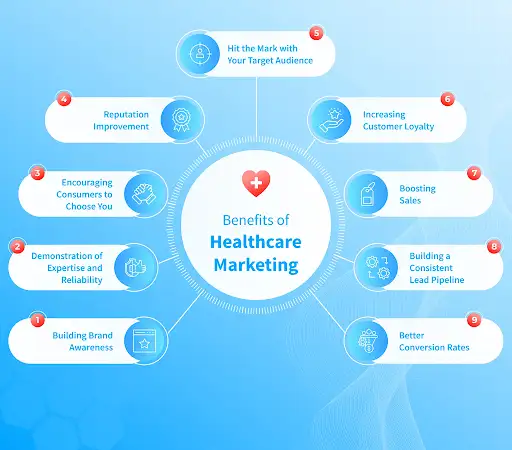
Having a well-structured healthcare marketing plan offers several advantages. Here are some key benefits of a healthcare marketing plan:
- Improved Patient Engagement: A targeted healthcare marketing plan helps in creating content and messages that resonate with your audience. This increases patient engagement and builds trust.
- Enhanced Brand Recognition: Consistent branding across all marketing channels helps patients recognize and trust your healthcare services. This can lead to increased patient loyalty and referrals.
- Better Patient Education: Through informative content and regular updates, patients stay informed about their health and the services you offer. This healthcare marketing plan empowers them to make better health decisions.
- Increased Online Visibility: By optimizing your website and using SEO, your healthcare services become more visible online. This attracts more patients searching for healthcare solutions.
- Efficient Use of Resources: A clear healthcare marketing plan helps in allocating your marketing budget and resources effectively. This ensures that every dollar spent contributes to achieving your goals.
- Effective Communication: A healthcare marketing plan ensures that your communication is clear and consistent across all platforms. This includes your website, social media, email, and any other channels you use.
- Streamlined Patient Support: Implementing a healthcare chatbot provides instant responses to patient inquiries.
Chatbots can be used on various platforms like WhatsApp, Instagram, Messenger, and your website.
They can handle appointments, provide information, and answer frequently asked questions. This improves patient satisfaction and frees up staff time.
- Data-Driven Decisions: With performance monitoring, you can track which strategies are working and which aren’t. This data-driven approach allows for continuous improvement and better decision-making.
- Competitive Advantage: A well-executed healthcare marketing plan sets you apart from competitors. It highlights what makes your services unique and why patients should choose you.
- Compliance and Trust: Following a structured healthcare marketing plan ensures that all marketing activities comply with healthcare regulations. This builds trust with patients and protects your organization from legal issues.
- Long-Term Growth: Consistent healthcare marketing plan efforts lead to long-term growth. A solid healthcare marketing plan helps build a loyal patient base and ensures sustained success.
A healthcare marketing plan is crucial for any healthcare organization looking to grow and succeed. A healthcare marketing plan not only enhances patient engagement and trust but also ensures that your marketing efforts are effective and compliant.
By leveraging strategies like chatbots in healthcare, social media, and SEO, you can reach more patients and provide better care.
11 Tips for Crafting Your Healthcare Marketing Plan
Creating a healthcare marketing plan can be daunting, but breaking it down into manageable steps can make the process easier.
Here are some tips to help you craft an effective healthcare marketing plan. These tips will ensure your marketing efforts are well-targeted, goal-oriented, and brand-centric.
1. Understand Your Audience

Knowing your audience is crucial for any healthcare marketing plan. When you understand who you are trying to reach, you can tailor your messages and strategies effectively.
- Conduct Surveys and Interviews: Use surveys and interviews to gather information directly from your patients. Ask about their healthcare needs, preferences, and how they prefer to receive information.
For example, a pediatric clinic might find that young parents prefer updates via social media while older patients prefer email newsletters.
- Analyze Demographics: Study the demographics of your patient base. Look at factors such as age, gender, location, and income level.
This data helps you create targeted campaigns. For instance, a fertility clinic may target women aged 25-40 in urban areas.
- Patient Personas: Develop patient personas to represent your different audience segments. This helps in visualizing and addressing the specific needs of each group.
A dermatology practice might create personas for teenagers with acne, middle-aged patients with cosmetic concerns, and elderly patients with skin conditions.
Understanding your audience ensures that your marketing messages resonate with those you are trying to reach.
2. Set Clear Goals
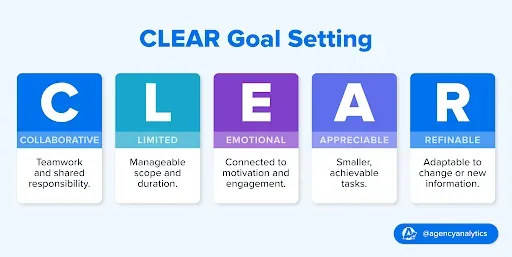
Setting clear goals is essential for the success of your healthcare marketing plan. Goals provide direction and a way to measure success.
- SMART Goals: Set SMART goals (Specific, Measurable, Achievable, Relevant, Time-bound). For example, a goal might be to increase website traffic by 20% in six months through improved SEO and content marketing.
- Patient Acquisition: Define how many new patients you want to attract within a specific period. A dental clinic might aim to acquire 50 new patients in the next quarter by offering a free initial consultation and promoting it through social media and email campaigns.
- Patient Retention: Set goals for retaining existing patients in your healthcare marketing plan. For example, a general practice might aim to increase patient retention by 10% through a patient loyalty program that includes regular health check-ups and personalized follow-ups.
- Service Promotion: Focus on promoting specific services. A physical therapy clinic might set a goal to increase awareness of their new sports injury program by hosting free community workshops and leveraging local media coverage.
Clear goals help you stay focused and measure the effectiveness of your healthcare marketing plan.
3. Develop a Strong Brand
A strong brand is vital in marketing for healthcare. It builds trust and differentiates your services from competitors.
- Consistent Branding: Ensure consistency across all marketing channels for effective outcome of your healthcare marketing plan. Use the same logos, colors, fonts, and messaging.
For instance, a cardiology clinic should have the same look and feel on its website, social media profiles, and printed materials.
- Core Values and Mission: Clearly define and communicate your core values and mission. Patients need to know what you stand for.
A holistic health center might emphasize its commitment to natural and integrative therapies across all its marketing materials.
- Patient Testimonials: Use patient testimonials and reviews to build credibility. Share success stories and positive feedback on your website and social media.
For example, a bariatric surgery clinic might feature video testimonials from patients who have successfully lost weight and improved their health.
- Professional Design: Invest in professional design for your website, brochures, and other marketing materials. A sleek and modern design can convey professionalism and trust.
A cosmetic surgery practice might use high-quality images and a clean, elegant design to attract clients.
- Healthcare Chatbots: Implement a healthcare chatbot on your website and social media platforms. Chatbots can provide instant information and support to patients.
For example, a mental health clinic can use a chatbot for healthcare to answer common questions about therapy services and schedule appointments.
4. Create Valuable Content

Valuable content is the cornerstone of any successful healthcare marketing plan. It educates, engages, and builds trust with your audience.
- Educational Blog Posts: Write blog posts that address common health concerns and questions. For example, a pediatric clinic could post articles on childhood vaccinations, explaining their importance and addressing common myths.
This not only informs parents but also establishes the clinic as a trusted resource.
- Patient Success Stories: Share patient success stories to highlight the effectiveness of your treatments. For instance, a physical therapy center can create videos or written testimonials of patients who have recovered from injuries.
This real-world evidence can be very persuasive for potential patients.
- Infographics and Visuals: Use infographics to simplify complex medical information. A cardiology clinic might create an infographic showing the steps of a heart-healthy lifestyle.
Visual content is easily shareable on social media and can attract more engagement.
- Video Content: Create videos that demonstrate medical procedures, introduce staff, or offer health tips.
For example, a dental clinic could produce a video on proper brushing techniques. Videos can be particularly engaging and help humanize your practice.
Valuable content positions your healthcare organization as an authority and helps build a strong relationship with your audience.
5. Utilize Social Media

Social media is a powerful tool for marketing in healthcare marketing plan. It allows you to connect with your audience, share valuable content, and build your brand.
- Engage with Your Audience: Respond to comments and messages promptly. For example, a dermatology clinic should actively engage with followers by answering skincare questions. This interaction builds trust and shows that you care about your patients.
- Share Educational Content: Post educational content regularly. A nutritionist might share healthy recipes, tips for managing diabetes, or the latest nutrition research.
This keeps your audience informed and engaged.
- Live Q&A Sessions: Host live Q&A sessions to address patient concerns in real time. For instance, an orthopedic surgeon could hold a live session discussing common sports injuries and their treatments.
This can increase your reach and establish you as an expert in your field.
- Promote Events and Services: Use social media to promote upcoming events, workshops, or new services. A mental health clinic could use Facebook to advertise a free stress management workshop, attracting more participants.
- Healthcare Chatbots: Implement a healthcare chatbot, like BotPenguin, on your social media platforms. Chatbots can answer common questions, book appointments, and provide information about your services.
For example, a dental practice might use a chatbot for healthcare to handle appointment scheduling on Facebook Messenger, making the process more convenient for patients.
Utilizing social media effectively can greatly enhance your healthcare marketing plan by increasing visibility and patient engagement.
Suggested Reading:
11 Creative Ideas for Healthcare Lead Generation
6. Optimize Your Website
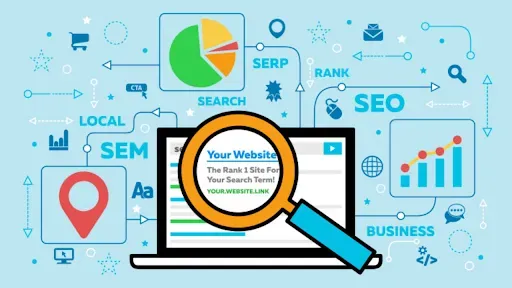
Your website is often the first point of contact for potential patients. So your next healthcare marketing plan is to optimize your website.
As an optimized website can improve user experience, attract more visitors, and convert them into patients.
- User-Friendly Design: Ensure your website is easy to navigate in the healthcare marketing plan.
A family practice should have clear menus, a search function, and easily accessible information about services, staff, and contact details. A well-organized website helps visitors find what they need quickly.
- SEO Best Practices: Use Search Engine Optimization (SEO) techniques to improve your website's visibility on search engines. This includes using relevant keywords, creating high-quality content, and optimizing meta tags.
For example, a dental clinic might use keywords like "teeth whitening" and "dental implants" throughout their website to attract more search traffic.
- Mobile Optimization: Make sure your website is mobile-friendly. Many patients will access your site from their phones, so it should load quickly and look good on smaller screens.
A fertility clinic with a mobile-optimized site will likely see higher engagement from busy parents on the go.
- Online Appointment Booking: Offer an online appointment booking system. This convenience can increase patient satisfaction and streamline your administrative processes.
For instance, a primary care clinic might provide an easy-to-use online form for scheduling check-ups.
- Informative Content: Provide detailed information about your services, staff, and treatment options. An orthopedic practice could include comprehensive guides on different types of joint surgeries.
This helps patients make informed decisions about their care.
- Healthcare Chatbots: Integrate a healthcare chatbot on your website to assist visitors. Chatbots can provide instant answers to common questions, guide users to relevant pages, and even schedule appointments.
For example, a mental health clinic might use a chatbot in healthcare to answer FAQs about therapy sessions and direct users to the appropriate therapist.
Optimizing your website ensures that it serves as an effective tool in your healthcare marketing plan, improving both patient experience and engagement.
Suggested Reading:
How to Implement Digital Marketing for Healthcare?
7. Implement a Healthcare Chatbot
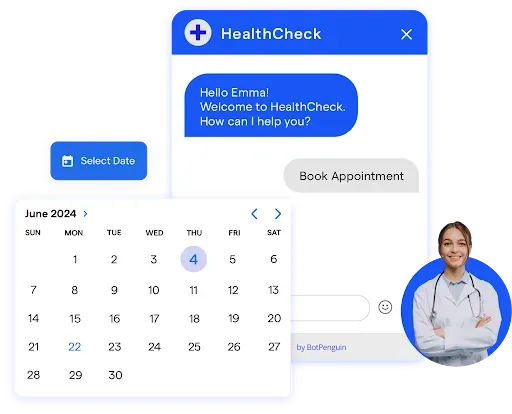
Healthcare chatbots are transforming how healthcare providers interact with patients.
These tools in healthcare marketing plan offer numerous benefits, from improving patient engagement to streamlining administrative tasks.
- Appointment Scheduling: Use a healthcare chatbot on your website to simplify appointment scheduling. Patients can easily book, reschedule, or cancel appointments without needing to call the office.
For example, a dermatology clinic can use a chatbot to allow patients to book consultations directly through their website.
- Customer Service: Chatbots can handle common inquiries, reducing the workload on your staff.
For instance, a dental clinic could use a chatbot for healthcare to answer questions about services, office hours, and insurance information on platforms like Facebook Messenger.
- Notifications and Reminders: Send automatic reminders and notifications through chatbots. A pediatric practice might use a chatbot to remind parents of upcoming vaccination appointments via WhatsApp.
- Marketing and Promotions: Utilize chatbots for marketing purposes. An eye clinic could use a chatbot to send out promotions and special offers to patients on Instagram.
This can increase engagement and drive more appointments.
- Multi-Platform Use: Implement chatbots across multiple platforms. A general practice can use chatbots on their website, WhatsApp, Facebook, and Instagram to ensure they are accessible wherever their patients are most active.
Healthcare chatbots can significantly enhance patient experience and streamline your healthcare marketing efforts, making them an essential tool in your healthcare marketing plan.
Suggested Reading:
Launching Healthcare Chatbot in 8 Easy Steps with BotPenguin
8. Use Email Marketing

Email marketing remains one of the most effective strategies in healthcare marketing plan. It allows for direct, personalized communication with your patients.
- Regular Newsletters: Send out regular newsletters to keep patients informed about your services, health tips, and upcoming events.
For instance, a cardiology clinic might send monthly newsletters with heart health tips and updates on new treatments.
- Personalized Emails: Use personalized emails to engage patients. A fertility clinic could send tailored emails based on where patients are in their treatment journey, providing relevant information and support.
- Appointment Reminders: Email reminders can reduce no-show rates. A dental practice might send automated emails reminding patients of their upcoming appointments, along with any preparation instructions.
- Health Campaigns: Run targeted health campaigns via email. For example, during flu season, a general practice could send emails about the importance of flu shots and offer easy scheduling through embedded links.
- Patient Feedback: Use email to solicit patient feedback. After a visit, a clinic can send a follow-up email asking patients to rate their experience and provide comments.
This can help improve services and patient satisfaction.
Email marketing is a powerful tool in any healthcare marketing plan, offering direct and efficient communication with patients.
9. Leverage Patient Testimonials

Patient testimonials are a crucial part in healthcare marketing plan. They provide social proof and build trust with potential patients.
- Website Testimonials: Feature testimonials prominently on your website. For example, an orthopedic clinic could showcase stories from patients who have successfully recovered from surgeries.
This can reassure new patients about the quality of care.
- Video Testimonials: Create video testimonials to make the stories more engaging. A plastic surgery center might produce videos where patients share their positive experiences and results.
Videos can be shared on your website and social media platforms.
- Social Media Shares: Share patient testimonials on social media. A pediatric practice could post weekly testimonials on Instagram and Facebook, highlighting different aspects of their care.
This can help attract new followers and build a positive online presence.
- Email Campaigns: Include testimonials in your email campaigns. For instance, a mental health clinic could feature patient success stories in their newsletters, providing inspiration and hope to other patients.
- In-Office Displays: Display testimonials in your office as part of your healthcare marketing plan. A dental office might have a bulletin board with printed testimonials and photos of smiling patients.
This can comfort patients while they wait for their appointments.
Leveraging patient testimonials effectively can significantly enhance the credibility and appeal of your healthcare marketing plan.
Suggested Reading:
How to Implement Healthcare Marketing Automation?
10. Monitor Your Performance

Regularly monitoring your performance is crucial to the success of your healthcare marketing plan. It helps you understand what’s working and what needs improvement.
- Set Up Analytics Tools: Use tools like Google Analytics to track your website traffic, user behavior, and conversion rates.
For example, a dental clinic can monitor how many visitors book an appointment after reading a blog post about teeth whitening.
- Track Social Media Metrics: Analyze engagement metrics on social media platforms. This includes likes, shares, comments, and followers.
A physical therapy center might track how their exercise tips posts on Instagram increase follower engagement and new patient inquiries.
- Email Marketing Metrics: Monitor open rates, click-through rates, and conversion rates of your email campaigns.
For instance, a fertility clinic can analyze which emails get the highest open rates, helping them understand what content resonates most with their audience.
- Patient Feedback: Collect and analyze patient feedback regularly. Use surveys and reviews to gather insights into patient satisfaction.
A general practice could send post-visit surveys to understand patient experiences and identify areas for improvement.
- Performance Dashboards: Create dashboards to visualize key performance indicators (KPIs). A cardiology clinic might have a dashboard displaying metrics such as new patient appointments, follow-up rates, and patient satisfaction scores.
- A/B Testing: Conduct A/B testing for different marketing strategies. For example, a dermatology clinic can test two versions of an email campaign to see which one generates more appointments.
This helps in refining your approach based on what works best.
- Adjust Strategies: Use the insights from your analytics to adjust your marketing strategies. If a pediatric practice notices that posts about child nutrition get the most engagement, they can focus more on creating similar content.
Regular monitoring allows you to make data-driven decisions, ensuring your healthcare marketing plan efforts are effective and continually improving.
11. Stay Compliant
Compliance is a critical aspect of marketing in healthcare marketing plan. Ensuring that your marketing efforts adhere to healthcare regulations protects your organization and builds trust with patients.
- Understand Regulations: Familiarize yourself with healthcare marketing regulations such as HIPAA in the United States.
This includes understanding what patient information can be shared and how to protect patient privacy.
For example, a mental health clinic must ensure that patient testimonials do not reveal any private health information unless explicitly permitted.
- Train Your Team: Regularly train your marketing team on compliance requirements. A plastic surgery practice might hold quarterly training sessions to update staff on the latest regulations and best practices.
- Clear Privacy Policies: Make sure your website has clear privacy policies explaining how patient data is collected, used, and protected.
An orthopedic clinic should have a comprehensive privacy policy accessible to all visitors.
- Patient Consent: Obtain explicit consent from patients before using their information in marketing materials. A dental clinic must get written permission from patients before featuring their testimonials on the website or social media.
- Secure Communication: Use secure channels for communication. An eye care clinic should use encrypted emails and secure patient portals for sharing sensitive information.
- Audit Your Marketing Materials: Regularly audit your marketing materials to ensure compliance. This includes reviewing website content, social media posts, and email campaigns.
For example, a cardiology clinic might conduct monthly audits to ensure all content adheres to regulatory standards.
- Stay Updated: Keep abreast of changes in healthcare regulations. Subscribe to industry newsletters and attend relevant webinars and conferences.
A fertility clinic could assign a compliance officer to stay informed about regulatory updates.
- Legal Review: Have legal experts review your marketing strategies and materials. For instance, a general practice might consult with healthcare attorneys to ensure their advertising campaigns comply with all applicable laws.
Ensuring compliance in your healthcare marketing plan protects your organization from legal issues and builds trust with your audience.
Adding the Finishing Touch to Your Healthcare Marketing Plan
In conclusion, effective healthcare marketing plans are essential for success. As the industry evolves, marketing in healthcare must adapt to meet changing patient needs and technological advancements.
Healthcare providers who embrace innovative approaches, including the use of healthcare chatbots, position themselves for growth and improved patient engagement.
BotPenguin offers cutting-edge chatbot solutions tailored for healthcare marketing, enabling providers to enhance their digital presence and patient communication.
By integrating a chatbot for healthcare into their marketing plans, organizations can streamline interactions, provide 24/7 support, and gather valuable patient insights.
As marketing for healthcare continues to shift towards digital platforms, tools like BotPenguin's healthcare chatbots become increasingly vital.
By leveraging BotPenguin's technology in the healthcare marketing plan, providers can stay ahead of the curve, fostering stronger patient relationships and driving sustainable growth in the ever-changing healthcare sector.
Suggested Reading:
Future and Growth of Global Healthcare Chatbot Market
Frequently Asked Questions (FAQs)
What strategies can improve patient engagement in healthcare marketing plan?
To improve patient engagement in healthcare marketing plan, utilize personalized content, social media interaction, patient education materials, email campaigns, and patient feedback systems to enhance engagement and build stronger relationships with patients.
How important is digital marketing in healthcare?
Digital marketing is crucial, offering broader reach, targeted advertising, and enhanced patient engagement through websites, social media, email marketing, SEO, and online patient reviews.
How can I effectively use social media in a healthcare marketing plan?
To effectively use social media in healthcare marketing plan, share informative content, patient testimonials, health tips, and updates on services; engage with patients through comments and messages; and run targeted ad campaigns to reach specific demographics.
How can I leverage patient reviews in my healthcare marketing plan?
In healthcare marketing plan to leverage patient reviews encourage satisfied patients to leave reviews, respond to feedback, and showcase positive reviews on your website and social media to build credibility and attract new patients.
What budget should I allocate for the healthcare marketing plan?
Budget for healthcare marketing plan depends on practice size, goals, and marketing channels; typically, allocate 7-10% of revenue for comprehensive marketing efforts, adjusting based on specific needs and performance analysis.


